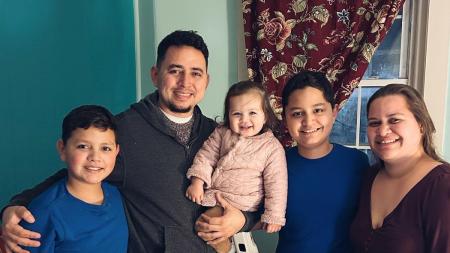Seminary to Offer Master’s in Counseling

This fall, Calvin Theological Seminary (CTS) will be offering a Master of Clinical Mental Health Counseling degree program to its academic offerings. The 60-credit program, approved by the CTS board of trustees in February, will include coursework in religious and theological foundations, clinical counseling, and clinical practice.
“The program is for anyone interested in clinical mental health counseling who also wants a counseling program rooted in Reformed theology,” said Jennifer Settergren, director of financial aid for CTS.
“We have had interest from alumni who are pastors, educators, and nonprofit leaders. The foundations of the program will prepare students to take the state exams for counselors. The curriculum is centered on those requirements and on teaching students how to integrate faith and theology into their practice.”
Dr. Danjuma Gibson, an experienced scholar, theologian, and psychotherapist, is serving as the program director for this initiative. He said that students from anywhere in the world are invited to participate because the program will offer flexible learning formats: residential, fully remote, or hybrid.
“This master’s degree is unique in its potential for customization,” he said. “From foundational coursework to clinical placement, this curriculum is designed to help students meet their goals and fulfill their callings with excellence.”
So why would a Christian Reformed seminary offer a degree program like this?
Settergren says it is partly because current and former students have asked for this kind of program.
“We have had a lot of interest from alumni who are serving congregations, in chaplain roles, and in education settings,” she said, noting that counseling skills will help deepen people’s abilities to serve in a variety of pastoral settings. “I am excited to see how the Lord uses this program to serve the kingdom in ways that CTS has not been connected to before.”
Jul Medenblik, president of CTS, said that the program is also timely and meets a need in society. The demand for licensed mental-health counselors is high in both the United States and Canada. The U.S. Bureau of Labor Statistics, for example, projects that employment for mental-health therapists and counselors, as well as addiction and behavioral counselors, will far outpace the employment average in all other labor categories by 2031.
“This is a situation where the clear and growing needs of the church and society meet the central feature of our mission to equip biblically faithful and contextually effective ministry leaders with the skills needed to provide counseling and mental health services to this hurting world that God still so loves,” Medenblik said. “Students can expect to discover the depths of God’s love for his people, and to grow in sharing compassion with fellow humans through best practices in counseling.”
Since announcing the program in February, CTS has already received several applications.
“The response from alumni has been overwhelming,” said Settergren. “We hosted a Zoom meeting with myself, admissions staff, and the program director, Dr. Gibson. We had 18 alumni sign up to learn more about the program. It is exciting to see former students interested in returning to CTS for further training. It speaks well to the relationship we have with our alumni and the loyalty they have to us.”
All who are interested in joining the inaugural class in the Master of Clinical Mental Health Counseling program this fall should apply by July 1.


